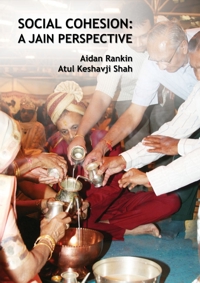One of the distinctive features of Indian culture is the nature of family. The word used is ‘kutumb’ which means the extended relatives such as uncles, aunties, cousins, nephews - all comprise part of one family and must be invited to all important occasions. This is why the guest list at Indian weddings often numbers in the hundreds - the number of close family members can easily be that large. The marriage ceremony and vows celebrate the importance of family and the role of parents in upholding its values and keeping its unity. At times of difficulty, the family rallies around to support one another. Sharing is the essence of family - in both pain and success. It is also true that ‘kutumb’ extends to nature and animals - in farming families, the animals are cared for as if they were a part of the family. This practical inclusiveness of nature promotes humility, reverence and respect for one and all.
Whilst the state cannot run people’s personal lives, it can promote good ways of living through art, education and media. In particular, tolerance and mutuality if taught and expressed as a key family value would help reduce the large number of family break-ups in this country. There is clear evidence that breakups are very costly - emotionally, spiritually, physically and financially, for both families and the state. Worse is the long-term impact on children and their security, health and well-being. All too often, this larger span of life and long-term nature of families is not understood and the culture often allows intolerance and selfishness. Family cohesion is the bedrock of social cohesion. That is why a lot of resources need to be devoted to this area if we are to build cohesive communities. Stories about families, tolerance and mutuality can be discussed in the classroom from an early age. Theatre and drama could explore issues associated with family and relationships. For teenagers, an explanation of the significance of family break-up and the rationale of tolerance and understanding in times of disagreement can help towards developing a commitment to marriage and sound families.
Families naturally extend into communities. Involvement in the community is a part of growing up in Jain culture. Parents get involved in community activities and children automatically join in, thereby experiencing the community spirit directly and participating in its nurturing. Not all these events have a pure religious dimension - often they are social and cultural e.g. festival celebration, children’s variety shows, cooking classes and demonstrations, sports competitions, adventure trips and holidays, trips and outings. All these serve to bind families and the community, helping people to see the benefits of connectedness and sharing. For children and teenagers, the community helps create natural role models and support networks, providing priceless mentoring. There is no exclusion of people of any kind from these activities - whether they are single parents, rich or poor, disabled or different in any way. Participation is open to one and all.
Encouraging families to get involved in local community activities is a good way of promoting cohesion. The benefits of involvement could be explained and the spirit of volunteering could be nurtured from an early age. Mutuality would then be directly experienced. If gatherings are along non-religious lines, then there would be no discrimination based on belief and people would see the benefits of one another and the non-exclusivity of any faith. A shared spirit of cohesiveness could be nurtured in this way.
We also recommend:
- Encourage employers to take a broader view of skills and experiences to include cultural diversity and homemaking - this would be of help to parents, particularly mothers, who wished to return to work, full-time or part-time, when their children are older.
- Joint or extended families provide care and respect for elderly, which can never be replicated by institutional care. Grandchildren learn a lot from grandparents living together or nearby and this provides support and stability to the young and growing family.
- Broadening of cultural understanding of ‘family’ to include friendship networks, neighbours, work colleagues, local community.
Restoration of married couples’ tax allowance (this would apply to people in civil partnerships as well) Extension of ‘child care’ tax credits to couples where one parent (mother or father) chooses to stay at home.
 Aidan Rankin
Aidan Rankin
 Dr. Atul Keshavji Shah
Dr. Atul Keshavji Shah
